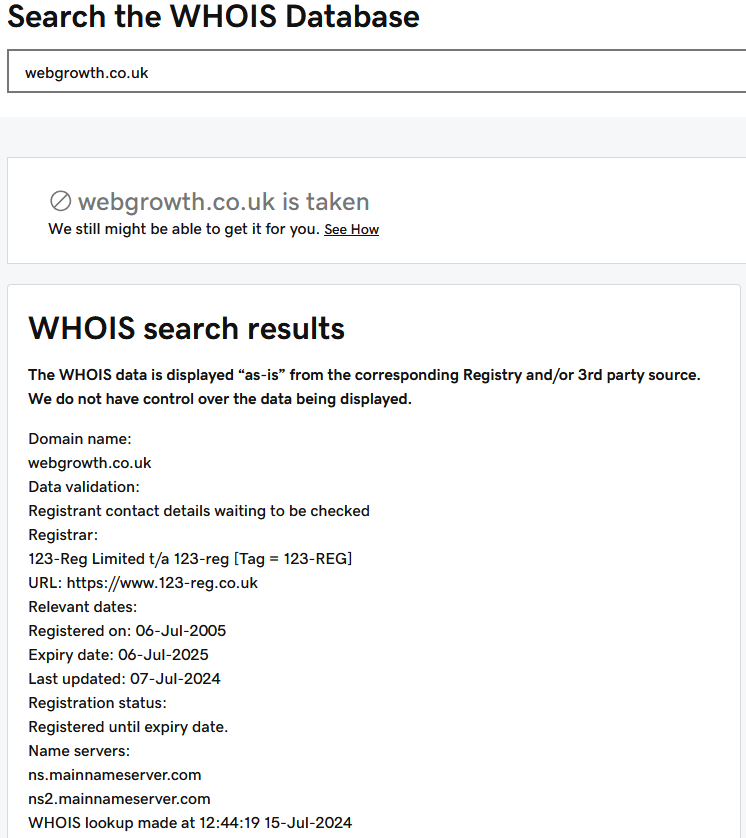All businesses need to understand their web design options and a key step is choosing domain names. You do need to understand what options are available to you so can make choose what sort of website you need, who makes it for you and what features you need. It also means you can make an informed decision about a realistic budget.
First step – get a domain name
You have a business idea and a potential brand name. The next thing you need is a domain name.
A domain name is the text that a user types into a browser window to reach a particular website. For instance, the domain name for this website is webgrowth.co.uk. We bought it many years ago in 2005 and have renewed the registration every year since then.
 Your domain name is a human readable string of text that maps to an alphanumeric IP address, used to access a website from client software. For websites that usually means a web browser like FireFox, Edge or Chrome. This means that someone typing your domain name into a web browser from anywhere in the world will be taken to your website.
Your domain name is a human readable string of text that maps to an alphanumeric IP address, used to access a website from client software. For websites that usually means a web browser like FireFox, Edge or Chrome. This means that someone typing your domain name into a web browser from anywhere in the world will be taken to your website.
The IP address that is associated with your domain name points to where your website is hosted. Owning a domain name also means that you can set up domain based emails and other domain related services such as email marketing.
Choosing a domain name
A good domain is unique, short, and easy to remember. A good domain name avoids using other people’s trademarks or brand names, complicated words and words that have similar spellings to other words.
It should also be easier to understand and say over the phone or in a presentation, meeting, talk or social media video. If you have to spell it every time then it might not be the right choice. That said, you might already have a registered business name and you want the domain name to reflect that.
Here are some of the best tips on choosing a domain name
- Choose a domain name that is short and easy to type
As we have said before the domain name should easy to say, type and spell.
- Choose a memorable domain name
There are millions of domain names so try to find a name that people can remember.
- Choose a domain name without numbers and hyphens
Numbers and hyphens in domain names are often misunderstood — people who hear your website address don’t know if you’re using a numeral (5) or it’s spelled out (five). If you’re using hyphens, people might put them in the wrong place or forget them altogether.
Numbers and hyphens complicate your domain name, making it harder to remember and type. That makes your business harder to remember.
- Consider using keywords in your domain name
You might want to include keywords that describe your business such as plumber, accountant, designer in addition to your branding or business name. Even if you don’t end up using the domain it is often good practice to purchase variations of your domain so nobody else can use it.
- Choose a domain name that targets your area
If your business is local, consider including your city or area in your domain name to make it easy for local customers to find and remember.
- Decide on your top level domain e.g. .com, .co.uk etc
There are plenty of new domain name extensions available today, from the original .com, .net, and .org TLDs (top-level domains), to niche extensions like .pizza, .photography, .biz, and even .blog.
If your business is local to a country or a town, you would benefit from a country extension such as .co.uk or .uk. Normally .com is for businesses and .org is for charities or NGOs (Non-Governmental Organisations).
If you do buy one of the funkier TLDs then you should also buy the relevant .com or .co.uk in case someone is tempted to buy it themselves and sell it back you or try to pass themselves off as your business.
We are happy to discuss and advise on choosing a domain name.
Get in touch with Dinesh on 07941 686113 or contact us if you need help on web design, web hosting, SEO services or domain names.
Further reading
How to Choose the Best Domain Name (14 Tips and Tools)
10 tips for choosing the perfect domain name
Image by Jireh Gibson from Pixabay







